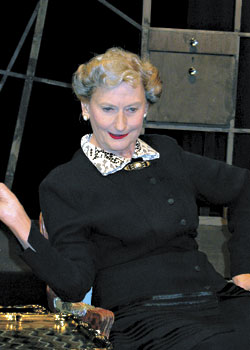Mrs. Klein
Fascinating, disturbing, and rewarding, Sight Nine’s production of Nicholas Wright’s three-character period piece, Mrs. Klein, is just the sort of fringe work that should significantly up this city’s reputation as a thriving center of strong, independently produced theater. Based on the real-life author and child analyst Melanie Klein, the play works on multiple levels simultaneously: as a family drama, as an anatomy of intellectual hubris and antebellum anxiety, and as a kind of suspense story with a mysterious death at its center.
By keeping a tight, almost claustrophobic focus on the tangled emotions of its three principals, director Susanna Burney is able to capture in small, intimately detailed strokes the whole complex world of pre–World War II Europe, a civilization seemingly teetering on the brink of destruction as its best minds recline on Freud’s fabled couch, giving voice to dreams and fears in the symbolic language of psychoanalysis. Wright’s parlor-room drama is extremely sophisticated and intellectually ambitious, but its high-toned dialogue and difficult themes are neither off-putting or stodgy; thanks to an excellent cast and Burney’s swift, assured direction, Mrs. Klein moves with a subtle force that gathers an unlikely momentum until its final scene, and beyond.
Set in London in 1934, the story hinges on the sudden death of Klein’s only son, Hans, who apparently fell during a hike in Budapest. As the play opens, Mrs. Klein (wonderfully played by Betty Campbell) is interviewing Paula (the excellent Linnet Blumenthal), a Jewish psychiatrist who has sought out the famous author after fleeing Berlin. Strangely drawn to this taciturn young woman, Klein decides to hire Paula to edit the manuscript of her latest book. Klein leaves Paula to work in her study, though not before locking up the rest of the house, including her booze cabinet. Soon Klein’s daughter, Melitta (Heather Poulsen, also great), also an author and psychiatrist, stops by unexpectedly, and is shocked and disconcerted to find Paula, whom she knows, sitting at her mother’s desk, smoking and poring over her book.
When Klein returns, also unexpectedly, the three women engage in a dangerous and highly Oedipal dance, a battle of wits and wills that irrevocably changes their lives. Everything is at stake: Did Hans kill himself? Will Mrs. Klein reject Melitta’s love, opting instead to embrace Paula as her surrogate daughter? Can these three women, each brilliant but emotionally blocked, move beyond their own pain and fear to arrive at something approaching truth? With its charged atmosphere of filial betrayal, emotional paralysis, and unconsummated love, Mrs. Klein is a heartbreaking portrait of the ways intelligence and insight work to strangle rather than liberate the emotions. Its subject matter is cerebral and highly psychological, but its truths—about family, love, death—will hit you right in the gut.








